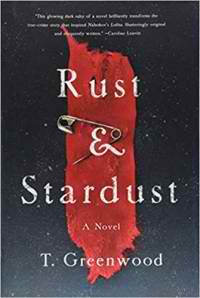Rust & Stardust by T. Greenwood
 Wednesday, November 28, 2018 at 9:30AM
Wednesday, November 28, 2018 at 9:30AM 
Published by St. Martin's Press on August 7, 2018
The first thing a potential reader should know about Rust & Stardust is that it addresses the sexual abuse of a preteen girl. Scenes in which the abuse occurs are far from graphic, but sensitive readers who would be severely distressed by the subject matter itself might want to avoid the novel.
The story is based on a young girl’s kidnapping that Nabokov read about while he was writing Lolita and to which he referred in the text. In fact, the title Rust and Stardust echoes a line from Lolita. That is where the comparison ends. Nabokov portrayed Lolita as a seductress who is far from innocent, while Rust & Stardust portrays the sexual assault of a clear victim.
Rust & Stardust begins in 1948. At age 11, Sally Horner is plump and friendless. A cruel trick by her classmates — a “single act of careless unkindness” — changes Sally’s life by placing her in the hands of a man who is posing as an FBI agent. Believing she’s about to be taken to FBI headquarters, Sally tells her mother she’s been invited to go with her friend on a vacation to Atlantic City, a story the man confirms in a telephone call. The man who calls himself Frank (his last names vary) holds Sally in Atlantic City for a month before Sally’s mother learns that Sally isn’t staying with her friend.
Frank eventually takes Sally to a string of cities, adopting new identities, sometimes enrolling her in school, and eventually tiring of her as she enters puberty. The police are slow to follow, despite prodding from Sally’s sister and her sister’s husband Al, who plays amateur detective. Sally’s mother frets and feels guilty but is otherwise useless. Sally makes friends along the way, but people who suspect she is in some sort of trouble do nothing to confirm their suspicions until Sally is gone.
Various characters, including Sally’s mother, feel guilt while the predator feels none at all. To a large extent, their guilt is the force that drives the narrative. The classmates who trick Sally eventually come to understand that their prank set the stage for the predator to kidnap her. They must live with that guilt as they get older. Sally blames herself, as children often do, for being a bad daughter who has earned the abuse she suffers. The predator’s friends facilitate his crime, only to feel remorse when it is too late to undo the harm. Sally’s mother has more than enough reason to blame herself for failing to prevent the kidnapping and for waiting so long before contacting the police.
While Rust & Stardust revolves around Frank’s abuse of Sally, T. Greenwood makes clear that Sally is also the victim of poor parenting, tabloid journalists, and a criminal justice system that (in the novel’s time frame) treated child victims as if they deserved to be incarcerated. The story covers all of those issues in convincing detail.
The story is disturbing because life is disturbing, including the life of Sally Horner as Greenwood imagines it to have been. But Rust & Stardust disturbs for the sake of offering insights into how victims and families handle trauma, not for the sake of sensationalizing a horrific crime. Most “every parent’s nightmare” stories overplay the melodrama that is inherent in stories about victimized children. Those that don’t too often read like a documentary, presenting just the facts in order to avoid obvious manipulation of the reader’s emotions. Neither a weepfest nor a clinical report constitutes good fiction. Greenwood manages to get the balance right, creating sympathy when characters deserve it without exploiting trauma for the sake of creating a spectacle.
RECOMMENDED
Reader Comments